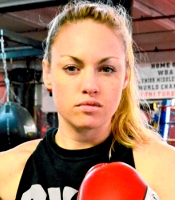| BoxingTalk Story |
By Scott Shaffer
26/12/2025

Former champion Heather Hardy has filed a lawsuit accusing leading boxing promoters and equipment companies of failing to protect her health, provide required insurance, and compensate her fairly during a career that left her with permanent brain injuries.The complaint, filed September 11th in New York state court, paints a vivid picture of Hardy’s rise from Brooklyn’s working-class neighborhoods to international stardom, and of the steep personal and financial toll that followed. Defendants in the case include promoter Lou DiBella, his company DiBella Entertainment Inc., Everlast Worldwide Inc., Boxing Insider LLC, Boxing Insider Promotions, and Frasers Group, Everlast’s corporate parent. Hardy claims these companies and individuals violated both contract terms and state athletic regulations by failing to provide her with required medical insurance and by structuring contracts that gave promoters near-total control of her career while shielding them from liability.
According to the filing, Hardy, now age 43, earned her nickname “The Heat” for her aggressive style and perseverance both inside and outside the ring. She turned to boxing in her twenties while raising her young daughter, balancing jobs and training at Brooklyn’s famed Gleason’s Gym. She eventually captured the WBO world featherweight title in 2018.
Here is an excerpt from Hardy's complaint: "When [former featherweight champion] Heather Hardy retired, it was not because she wished to rest on her laurels, nor, for that matter, because she wanted to retire at all. In early 2024, she was training for a bare-knuckle boxing bout when she suddenly lost her vision. When it didn’t return for several days, she saw an ophthalmologist, who informed her that the problem was not just with her eyes, it was with her brain. She then dropped out of the fight, she announced, because she 'had too much brain damage.' Media outlets reported her permanent retirement shortly after that. Today, Heather lives with chronic traumatic encephalopathy (CTE) and frontal lobe damage. She has daily seizures, convulsions, and muscle spasms. Her vision is impaired, she cannot sleep, she cannot read maps, and she frequently cannot distinguish right from left. She suffers from debilitating anxiety, for which she takes medication... Heather supports herself at a subsistence level by coaching other boxers—at least for a couple of hours a day, before her brain damage symptoms become incapacitating—at the very Brooklyn gym that was her own professional haven for many years. Yet, in perhaps the cruelest development among many, and despite being a former world champion boxer, she cannot afford the kind of private health insurance that would give her even a minimally appropriate level of treatment. Instead, she relies on Medicaid for whatever minimal treatment it provides for her physical, neurological, and psychological symptoms."
Hardy fought most of her professional bouts in New York, often at the Barclays Center and Madison Square Garden. The complaint recounts that she personally sold tickets, promoted her own events, and sometimes fought before half-empty arenas because female bouts were scheduled before audiences were allowed to enter. Yet she built a record of 24 wins and 3 losses, ranking her statistically alongside boxing greats such as Joe Frazier and Mike Tyson.
Despite that success, Hardy’s lawsuit says her financial rewards never reflected her accomplishments. Data from the New York State Athletic Commission cited in the complaint show her total gross earnings from New York fights at $236,450 over a 12-year career—an average of less than $20,000 per year. Prominent male fighters, the complaint notes, routinely earned millions per bout during the same era.
According to the lawsuit, Hardy’s promotional agreements incorporated New York State Athletic Commission rules requiring at least $1 million in coverage for brain injuries and $50,000 for other medical expenses. Hardy alleges she never received such coverage and was never given policy or claim information to access those benefits. The complaint describes the contracts she signed as “unconscionable” and “void as against public policy”—arguing they forced her to accept extraordinary health risks without adequate protection or representation.
Hardy’s legal team also contends that by the later years of her career she was already exhibiting symptoms of cognitive decline and vision problems, and that promoters should have recognized her compromised condition. She claims the contracts she signed from 2019 through 2023 should be declared void ab initio because she lacked full capacity to consent.
Her injuries culminated in 2024, when she suddenly lost her vision during training for a bare-knuckle fight. An ophthalmologist informed her that the cause was neurological, not optical, and she later announced her retirement, saying she had “too much brain damage.” She has since been diagnosed with chronic traumatic encephalopathy (CTE), frontal lobe damage, and post-concussion syndrome. The complaint describes her current life as one of seizures, impaired vision, memory loss, and dependence on Medicaid.
Now, Hardy seeks compensatory, consequential, and incidental damages for breach of contract and related claims, as well as declaratory relief to void exculpatory clauses in her contracts. She asks the court to strike any provisions that waive promoters’ responsibility for negligence or safety obligations and to award interest and legal costs. The complaint does not specify a dollar figure for damages.
Beyond Hardy’s personal claims, the case challenges broader industry practices that, according to the complaint, have long undervalued and endangered female fighters. It draws parallels to the NFL’s concussion controversies and argues that boxing, too, must face a “day of reckoning” over athlete safety.